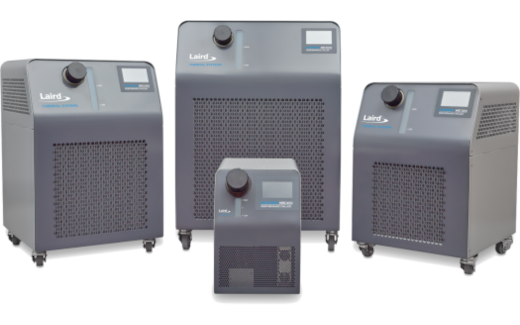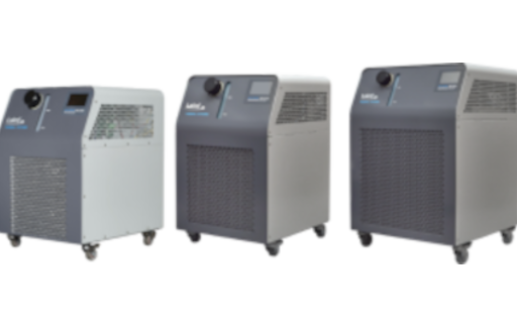The world relies on laboratories and the disciplines of Lab Science to conduct research, experiments, analyses, or investigations, to efficiently identify and/or produce accurate and repeatable results. Lab Science applications can involve chemical analysis, diagnostic imaging, biological testing, medical testing, environmental testing, materials testing, forensic testing, food and beverage testing, pharmaceutical testing, and many other types of tests to serve specific research, diagnostic or regulatory purposes. The tools, equipment and techniques used to observe, measure, and analyze solids, liquids or gases under controlled conditions must be reliable. The variety of equipment used in these highly controlled conditions is expected to have maximum uptime, provide reliable operation, and produce accurate results.
Many lab science applications require effective thermal management solutions—such as recirculating chillers, thermoelectric coolers, heat exchangers, and cold plates—to maintain stable temperatures critical for accurate measurements and controlled experimentation. Laboratories rely on these diverse technologies to ensure accurate and repeatable results in research, testing, and analysis. Each thermal management technology plays an important role but each technology has unique capabilities and ideal applications.
More specifically, recirculating chillers play a vital role in integrating with a variety of lab equipment and instruments enabling many of the processes and techniques to function as they were designed.
 Recirculating chillers are extremely versatile, self-contained thermal management systems that provide precise temperature control with temperature stability down to +/- 0.05°C. They feature a high coefficient of performance, high reliability combined with low noise and no harmful refrigerants, ideal for today’s Green Labs. Today’s chillers are expected to deliver cost-effective, maintenance-free operation for maximum system uptime, as well as be compliant with foreseeable future regulations with regard to refrigerant use. This includes using natural R290 refrigerant, with a near-zero Global Warming Potential (GWP) when compared to traditional hydrofluorocarbon (HFC) refrigerants.
Recirculating chillers are extremely versatile, self-contained thermal management systems that provide precise temperature control with temperature stability down to +/- 0.05°C. They feature a high coefficient of performance, high reliability combined with low noise and no harmful refrigerants, ideal for today’s Green Labs. Today’s chillers are expected to deliver cost-effective, maintenance-free operation for maximum system uptime, as well as be compliant with foreseeable future regulations with regard to refrigerant use. This includes using natural R290 refrigerant, with a near-zero Global Warming Potential (GWP) when compared to traditional hydrofluorocarbon (HFC) refrigerants.
 The equipment normally found in labs that require recirculating chillers include rotary evaporators, rheometers, electron and digital microscopes, bioreactors/fermenters, incubators, milling machines used in grinding samples into nanoparticles, vacuum systems, X-ray diffractometers, mixing vessels and diffusion pumps. These machines, equipment and instruments all rely on recirculating chillers to provide thermal stability for fluid separation, sample preparation, measuring flow, biological processes, analyzing the structure of matter, mixing chemical components, material processing, imaging and more.
The equipment normally found in labs that require recirculating chillers include rotary evaporators, rheometers, electron and digital microscopes, bioreactors/fermenters, incubators, milling machines used in grinding samples into nanoparticles, vacuum systems, X-ray diffractometers, mixing vessels and diffusion pumps. These machines, equipment and instruments all rely on recirculating chillers to provide thermal stability for fluid separation, sample preparation, measuring flow, biological processes, analyzing the structure of matter, mixing chemical components, material processing, imaging and more.
In analytical laboratories, recirculating chillers play a critical role in applications and processes like cell culture experiments and cell analysis, high-performance liquid chromatography for improving separation efficiency, gas chromatography for efficiently separating and analyzing volatile compounds, studying enzymatic reactions, localizing specific proteins in tissue samples, ultra-low temperature freezers and cryogenic storage units, small animal MRI systems, to name a few.
Materials science labs including semiconductor metrology used to analyze the electrical, optical, and thermal properties of semiconductor devices rely on recirculating chillers to evaluate mechanical properties at different temperatures and to provide the necessary temperature control for thermal cycling tests.
Through mass spectrometry, lab technicians identify the elements of a complex substance in applications including drug testing, food contamination detection, pesticide residue analysis, isotope ratio determination, protein identification and carbon dating. Recirculating chillers maintain stable temperatures in the ion source and detector regions.
 Medical laboratories use recirculating chillers to support experimental techniques and instruments that enable researchers and clinicians to conduct accurate and reliable diagnostics and investigations in various medical science and healthcare fields.
Medical laboratories use recirculating chillers to support experimental techniques and instruments that enable researchers and clinicians to conduct accurate and reliable diagnostics and investigations in various medical science and healthcare fields.
In summary, recirculating chillers are preferred solutions in Lab Science applications for their precise temperature control, low noise, high coefficient of performance, high reliability, no harmful refrigerants, and their versatility for use with multiple instruments and equipment across a variety of applications.
Categories
Blog Date

Related Products
Stay tuned for updates on thermal management industry regulations, new product releases, and innovative temperature control approaches with
LTS Thermal Solutions Spotlight:

